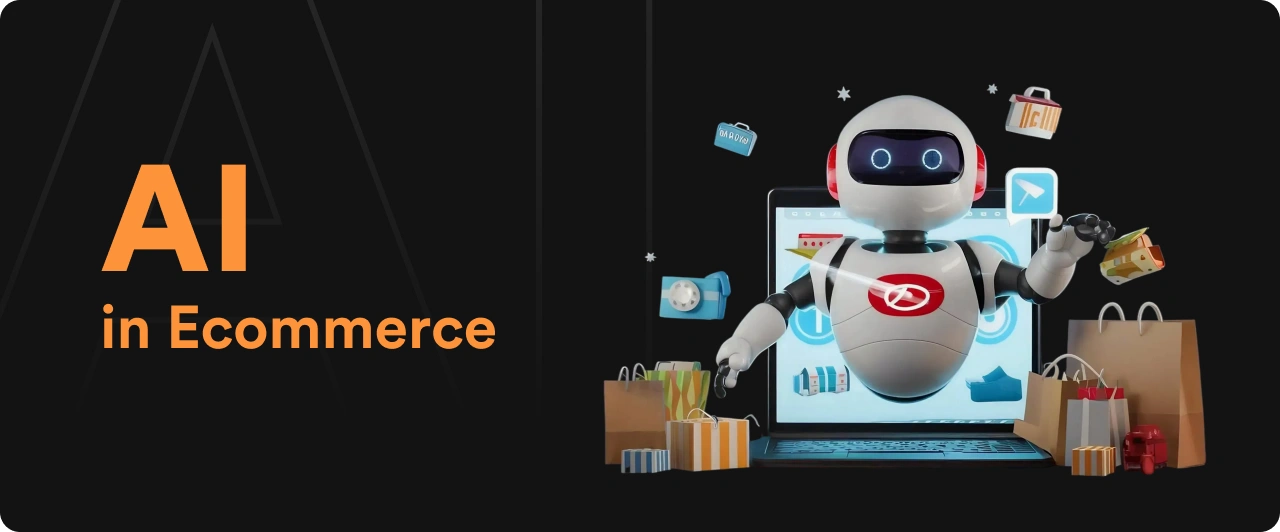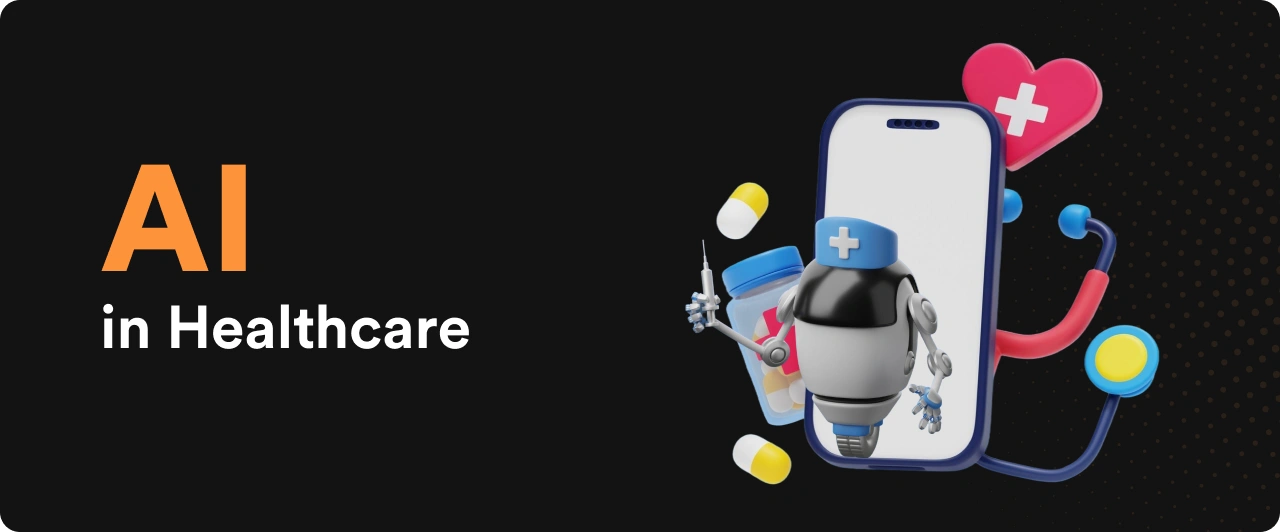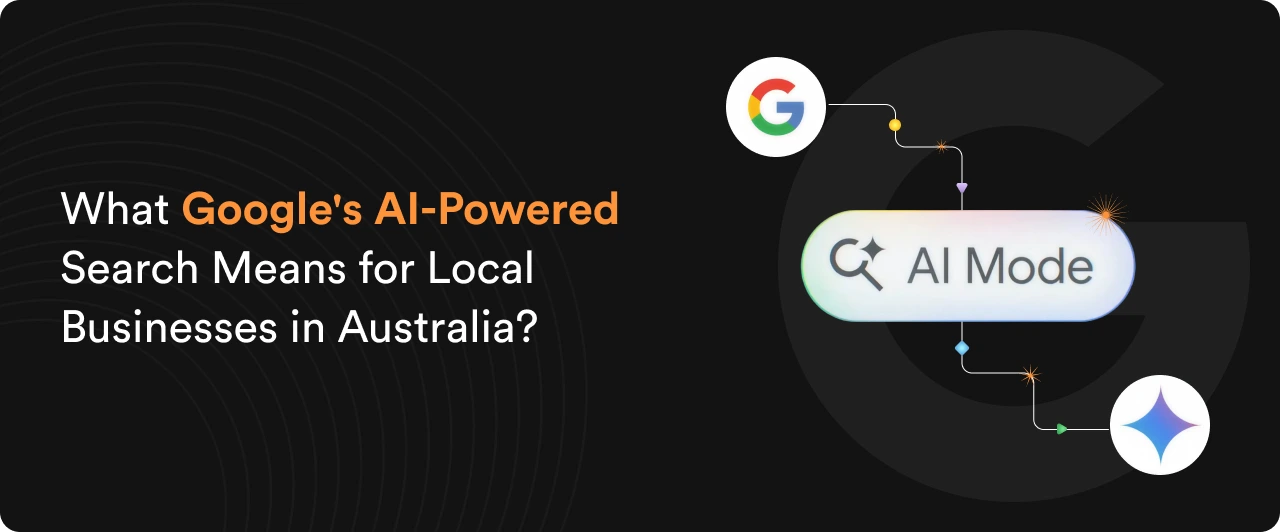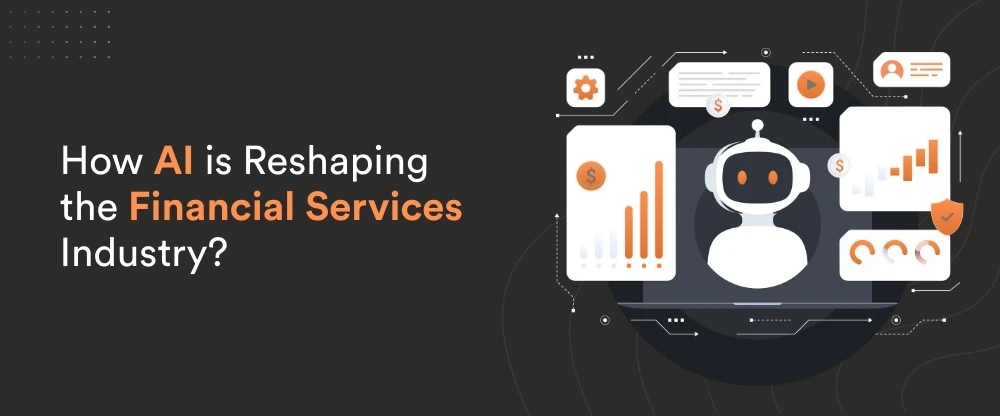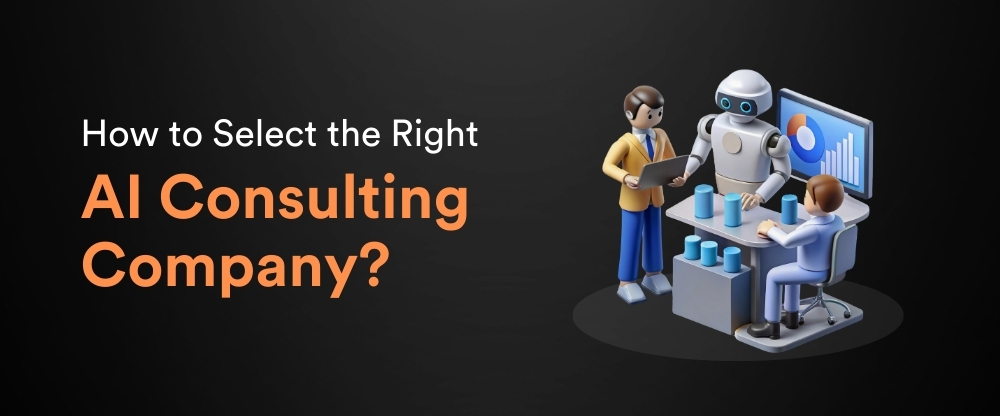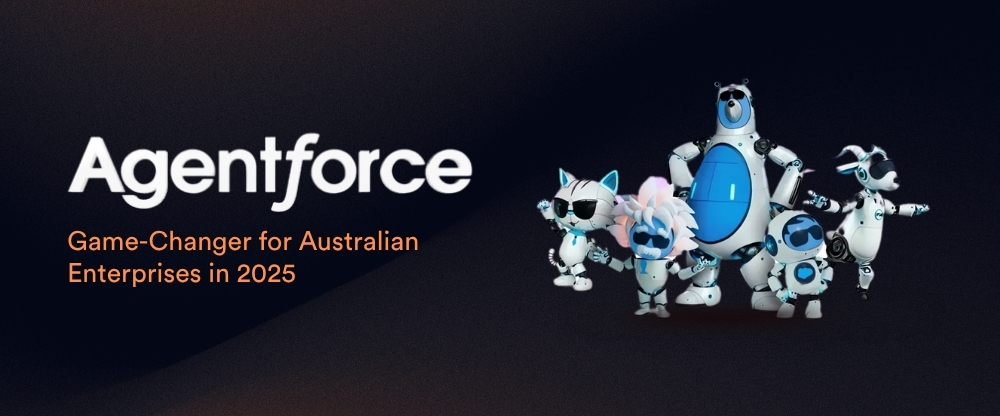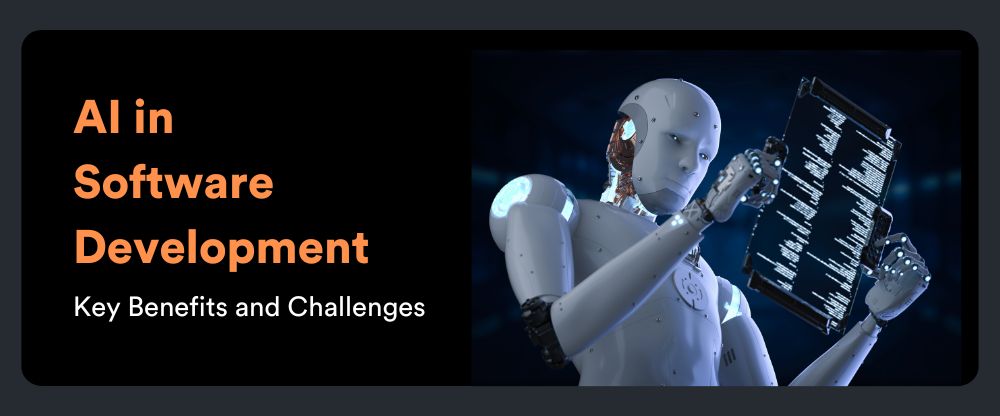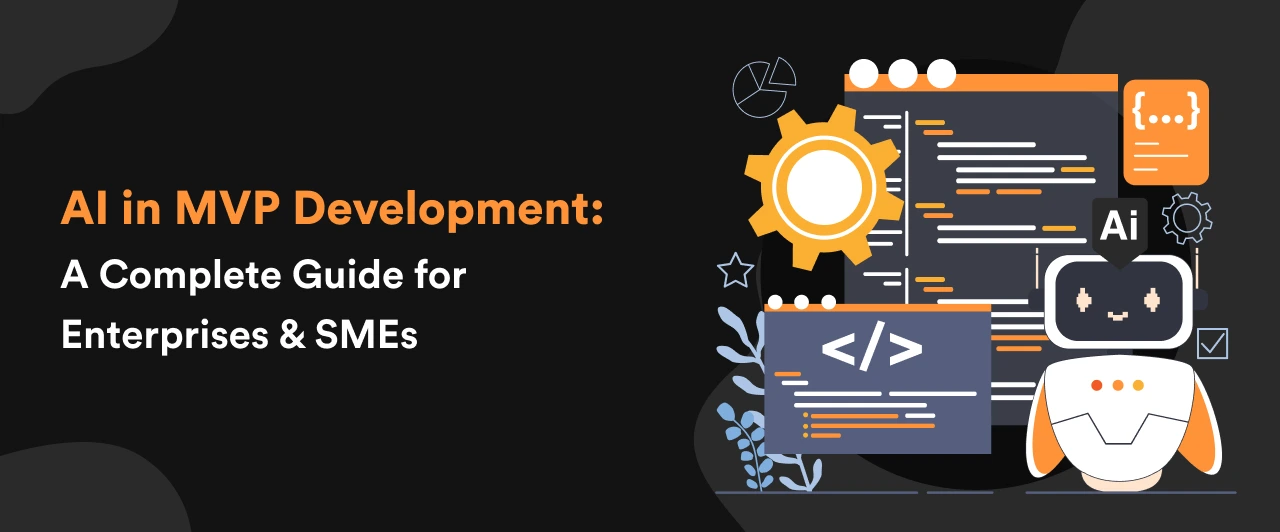
Introduction to Enterprise Web Apps Using Node.js
Building an MVP used to mean waiting months for user feedback. Not anymore.
Australian startups now use AI-powered MVPs that learn from the first interaction. From predictive analytics to chatbots, these products adapt in real-time instead of collecting dust while teams analyse spreadsheets.
The old approach, build, test, wait, analyse, repeat, takes too long. Markets move fast. AI development services help businesses validate ideas in weeks instead of months.
What Is AI-Driven MVP Development?
An MVP tests your core idea with minimal features. AI changes what “minimal” means.
Traditional MVPs collect feedback. AI-powered MVPs analyse behaviour patterns, predict user needs, and personalise experiences automatically.
Example: A fitness app MVP might track workouts. An AI version analyses patterns, predicts when users skip workouts, and adjusts recommendations based on progress.
Partnering with an AI development company means building products that learn continuously, not just gather data for later analysis.
Why AI Matters in MVP Development?
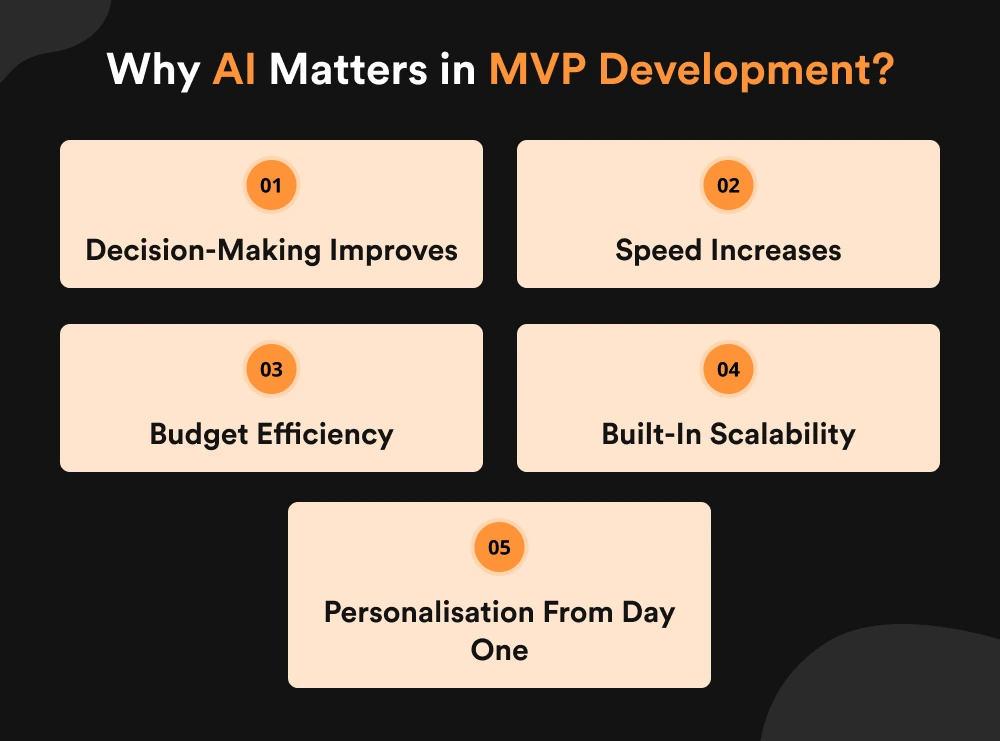
Traditional validation takes 6+ months. AI cuts that dramatically.
- Decision-making improves: AI identifies patterns in user behaviour that are not possible through manual analysis. So, now teams make evidence-based decisions.
- Speed increases: Iteration cycles drop from weeks to days. Competitors collecting survey responses while you’re shipping version 3.
- Budget efficiency: AI validates feature demand before development starts. No wasted engineering time on features nobody wants.
- Personalisation from day one: Users get tailored experiences immediately. They don’t need to wait for months of data to improve.
- Built-in scalability: Architecture adapts naturally. No need for expensive rebuilds when you grow.
MVP development services with AI capabilities turn concepts into market-ready products faster.
Key AI Technologies for MVPs
Different problems need different AI tools. Here’s what actually works.
Machine Learning (ML)
ML watches how people use your product and spots trends you’d never catch manually.
Which features get ignored? What makes users come back? Which customer types convert best? ML answers these questions with actual data, not assumptions.
Works even when you’re just starting with limited users.
Natural Language Processing (NLP)
NLP understands human language. Not just keywords, actual intent and context.
That chatbot that frustrates users? Probably lacks good NLP. One that actually helps? NLP is doing the heavy lifting.
Also powers sentiment analysis (how users really feel about features) and voice interfaces that don’t require memorising commands.
Computer Vision
Some MVPs need to see things. Literally. Healthcare products analysing X-rays or skin conditions. Retail apps let users snap photos to find similar products. Security systems spot unusual activity.
Computer vision handles any task where visual information matters. The cost has dropped enough that even early-stage MVPs can use it.
Predictive Analytics
This one looks ahead instead of backward.
What features will users want next quarter? Which market segment should you target? When’s the best time to launch that new capability?
Predictive analytics gives data-backed answers instead of guesses. For enterprises planning quarters ahead, this matters a lot.
Robotic Process Automation (RPA)
RPA tackles the boring stuff nobody wants to do.
Running the same tests repeatedly. Entering data into forms. Checking quality on routine tasks. Writing standard documentation.
Your development team stops wasting hours on this. They build actual features instead.
An experienced AI development company knows which technologies fit which problems. That matching makes the difference between useful AI and expensive complexity.
Traditional vs. AI-Powered MVP
Aspect | Traditional MVP | AI-Powered MVP |
| Data Collection | Manual surveys and interviews | Automated behavioral tracking |
| Analysis Time | Weeks | Hours or days |
| Iteration Speed | 3-4 weeks per cycle | Days per cycle |
| Personalization | Generic for all users | Tailored per user |
| Scaling | Requires rebuild | Grows naturally |
| Initial Cost | Lower | Higher |
| Long-term ROI | Slower | Faster |
AI development services help MVPs evolve during validation, not after.
How an AI Development Companies Support MVPs?
Strategic partners identify where AI adds value versus unnecessary complexity. Not every feature needs machine learning.
They handle the complete process:
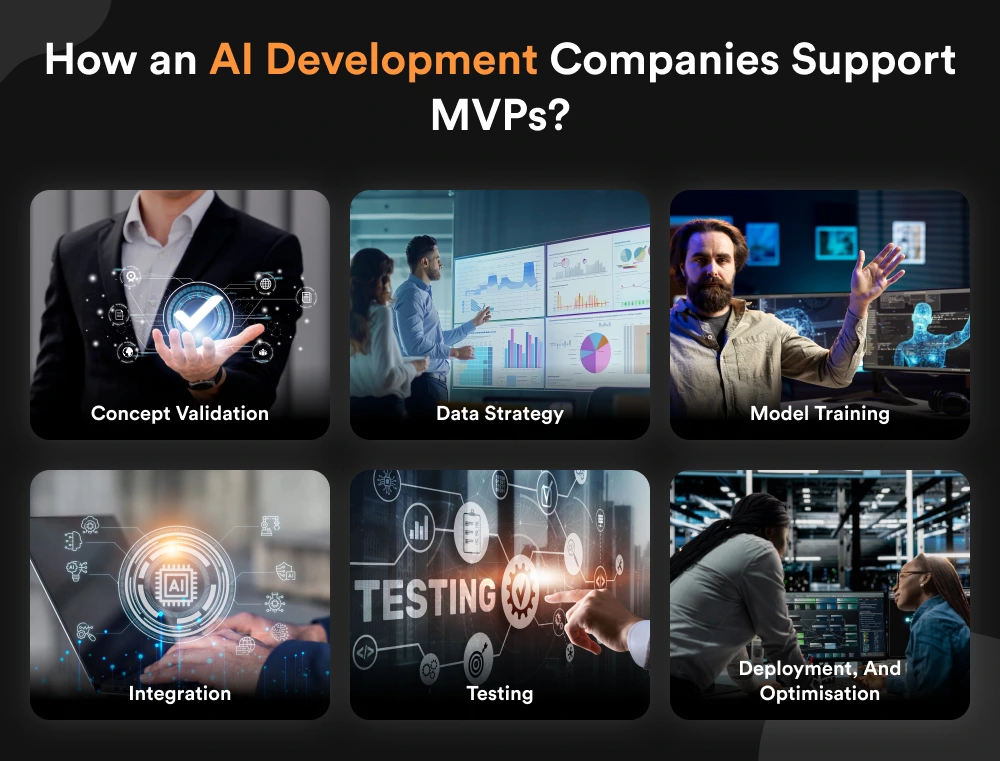
Building an AI-Powered MVP: Step-by-Step
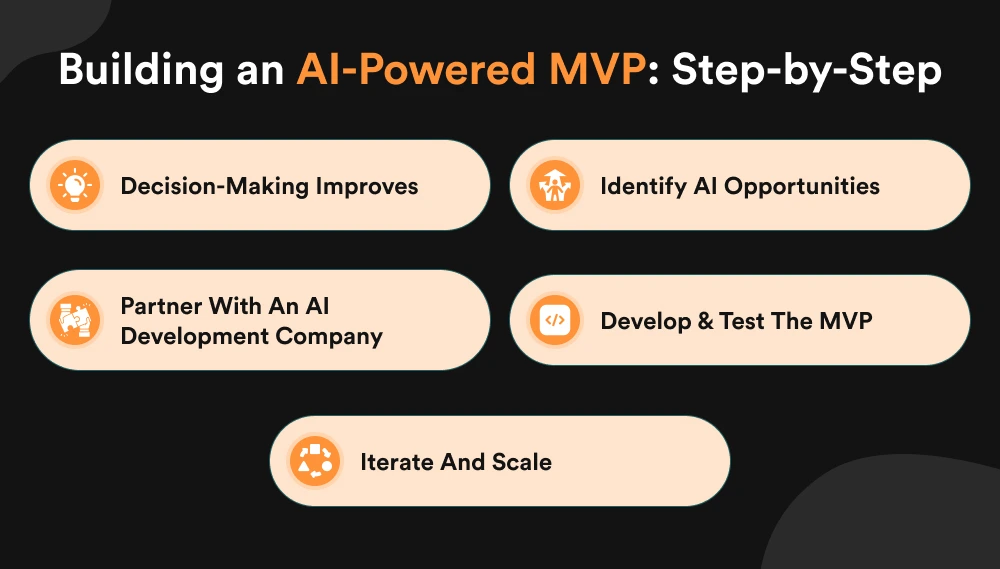
Step 1: Define Your Most Important Problem
Be very specific. “Reduce response time from 4 hours to 15 minutes” is specific. But “improve customer service” is not!
Step 2: Identify AI Opportunities
Match technology to the problem. Prediction needs? ML. Conversation? NLP. Visual processing? Computer vision. Some problems don’t need AI at all.
Step 3: Partner with an AI Development Company
Look for demonstrated success in similar use cases. Check references. Understand their data strategy approach.
Step 4: Develop & Test the MVP
Start with a fraction of your target market. Watch what they do, not what they say. Refine models based on actual behaviour.
Step 5: Iterate and Scale
Data shows which features to prioritise and which segments to target.
Professional MVP development services build validation processes that directly inform growth strategy.
🎧 Podcast: AI-Powered MVPs: Fast Validation Strategies for Enterprises & SMEs

Discover how AI slashes MVP timelines from months to weeks by automating validation, predicting user needs, and delivering personalised experiences from day one; this episode covers ML, NLP, computer vision, predictive analytics, costs, and a practical step-by-step playbook. Tune in to hear real-world strategies, tech choices, pricing ranges, and the execution roadmap enterprises and SMEs use to validate ideas fast and scale with confidence.
The Future Belongs to Intelligent MVPs
Businesses working with trusted AI development companies are building products that learn continuously and create competitive advantages that competitors can’t easily copy.
Frequently Asked Questions (FAQs)
AUD $20,000–$60,000 depending on complexity. Simple AI features cost less. Enterprise solutions with compliance requirements cost more. Data requirements significantly impact pricing.
6–12 weeks typically. Simple implementations finish in 6 weeks. Complex enterprise projects take 12+ weeks. AI automation speeds validation compared to traditional methods.
An AI development company offers complete lifecycle support. So you get professional concept validation to deployment and optimisation when you partner with a good development firm.
Three ways: focus only on essential features, automate learning from user data, and use rapid iteration cycles. This minimises risk while maximising learning speed.



